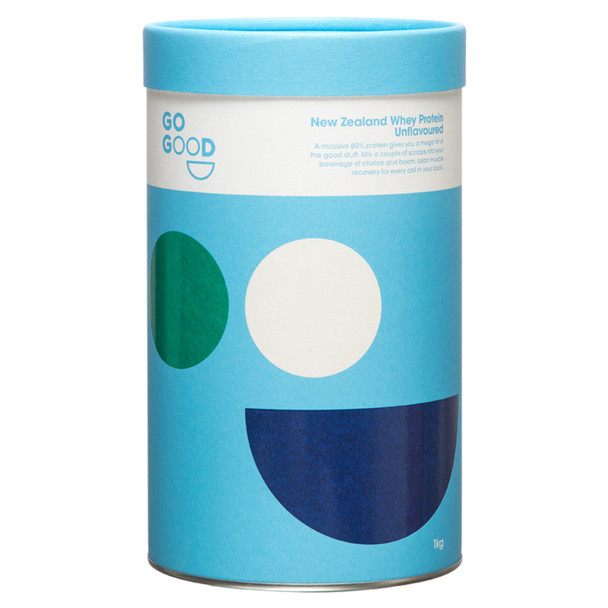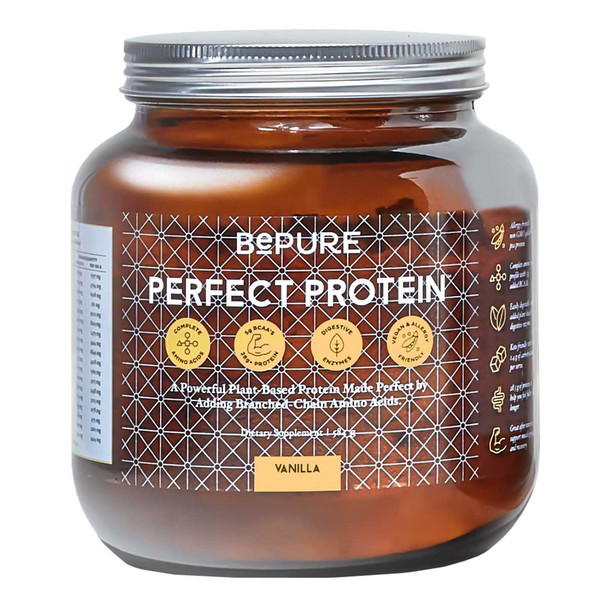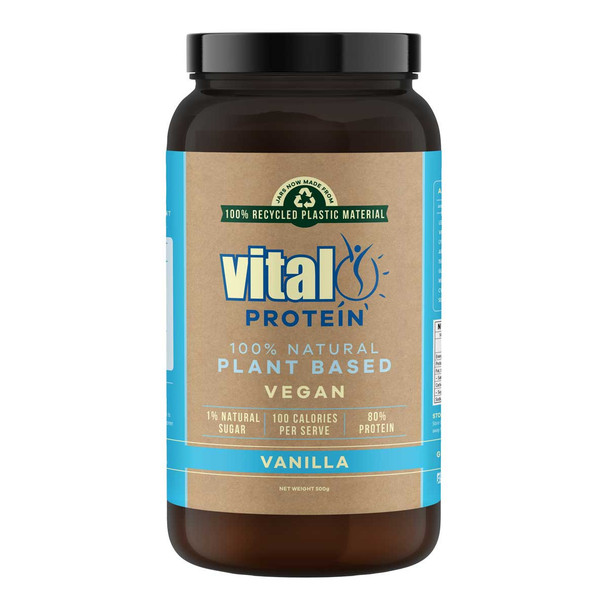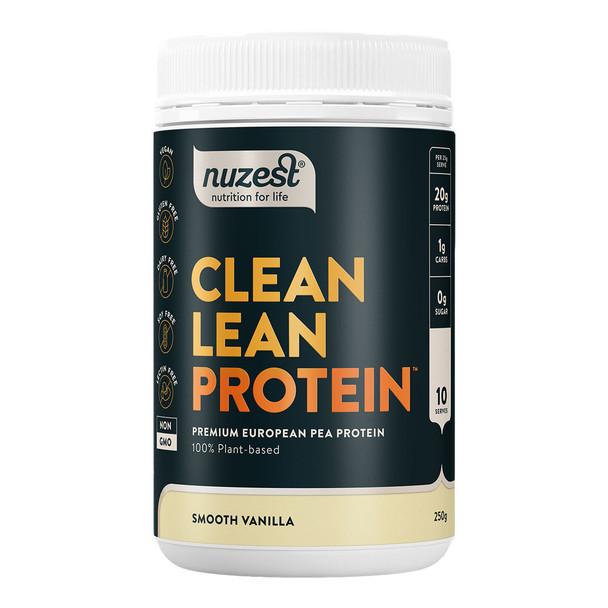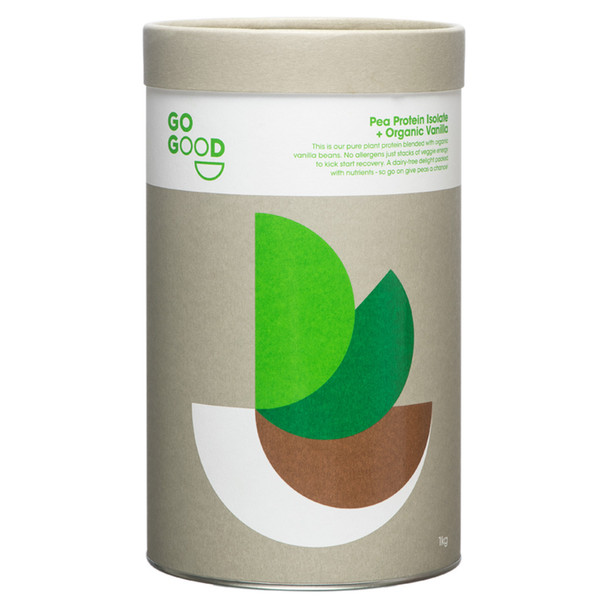
Protein Powders are an easy and healthy way to top up your protein intake. Add them to a smoothie, into your favourite recipe, or simply mix with your choice of water or milk. They’re a great option for active people, athletes, growing teens, during pregnancy and breastfeeding, or in later life when protein requirements increase. If you’re always on the go or following a vegetarian or vegan diet, protein supplements are a convenient way to up your protein intake. You’re spoilt for choice with the wide range of our bestselling, most-popular protein powders.
In this guide you’ll discover:
- What is protein powder?
- Why does the body need protein?
- How much protein do I need?
- Can I have too much protein powder?
- How to use protein powder?
What is Protein Powder?
Simply put, protein powder is a concentrated source of protein – either plant or animal based, along with other ingredients to add flavour. Each serving of a protein powder provides approximately 15 - 25 grams of protein, which is just the right amount to have at each meal. It’s an easy and delicious way to boost your daily protein intake.
Why does the body need protein?
When you eat protein, the body breaks it down into tiny amino acids which are added to a pool of amino acids, ready for the body to use when needed. Dietary protein supports the body to maintain muscle mass, and provides the amino acids needed for various processes, including making hormones, neurotransmitters, and regulating immune cells.
There are 20 amino acids that the body needs, and nine of these are known as ‘essential’. Essential amino acids cannot be made by the body when you’re running low, so you need to make sure you get plenty through your diet.
If the diet is low in protein, the body will mine the muscles for the amino acids it needs to carry out its important work (this can result in what is known as muscle wasting). This can also lead to changes inenergy, mood, and sleep.
How much protein do I need?
Protein is a ‘high satiety food’, which means it keeps you feeling fuller for longer. The amount of protein your body needs depends on a few factors including your age, sex, and how active you are. The recommended daily intake (RDI) of protein for each age and sex are:
- Females aged 19-70 need 46 g/day, over 70 need 57 g/day.
- Males aged 19-70 need 64 g/day, over 70 need 81 g/day.
- Growing children aged 1-3 need 14 g/day, aged 4-8 need 20 g/day.
- Boys aged 9-13 need 40 g/day, aged 14-18 need 65 g/day.
- Girls aged 9-13 need 35 g/day, aged 14-18 need 45 g/day.
These quantities have been supplied by the Nutrient Reference Tables for Australia and New Zealand.
Can I have too much Protein Powder?
Yes, it is possible to overdo it with protein. The maximum daily total protein intake for an adult is 2 grams of protein per kg of body weight. Too much can make it hard to pass stool, overload the kidneys, and lead to digestive issues. Consuming too much protein can also impact on your body’s ability to maintain ketosis, which is an important consideration if you are following a keto or low carb diet.
Fortunately, our protein powders list the recommended serving size on the label. Aim for approximately 20g of actual protein which is usually around 30g or 3 tablespoons of protein powder.
How to use Protein Powder:
Protein Powders are versatile, and depending on their other ingredients, they can be used to make a variety of drinks, snacks, and meals.
Protein Powder shakes are super quick and easy when you’re out and about. Mix protein powder with your choice of water, milk, or plant mylk in a shaker or blender. The secret to successful mixing is pouring the liquid first, and then adding the powder. Flavour and mixability are key when choosing a protein powder for a shake. Flavour is important because you’re not adding other flavouring ingredients. Pea and whey protein powders are consistent winners for mix-ability.
Protein Powder smoothies are healthy and nutritious as the protein powder is blended with liquid, fruit and veggies. Nuts, seeds, and superfood powders can be added too. Protein smoothies provide fibre, vitamins, minerals, antioxidants, healthy fats, and protein. Plus, they offer more variety of taste than a simple shake. Protein smoothies are an easy way to have a healthy, high protein breakfast.
Protein Powder in snacks and baking is another way to increase the protein content your food. The best thing about adding protein powder to foods: you can get creative and make your everyday foods healthier, especially helpful for busy families. Make a batch of these tasty Oaty Protein Bites for the pantry.
You can add protein powder to your raw, un-baked recipes, like protein slice, bliss protein balls or chia pudding. These colourful Earth Day Coconut Balls are packed will all sorts of goodness. You can also use protein powders to make tasty hotcakes and mix through a hot bowl of porridge (see our tips below on how to adapt a recipe).
Tips for baking with protein powder
- Using a recipe that lists protein powder as an ingredient is easier than adapting a recipe
- If you decide to have a crack at adapting your favourite baking recipe, you’ll need to experiment a bit.
- You can substitute up to half of the dry ingredients.
- Different types of protein powders have unique textures – they each react differently when cooked.
- Plant based protein powders are more absorbent than whey, so to balance this you’ll need to add more liquid or moist ingredients.
- A rubbery texture might result from too much whey protein.
- A dense, brick-like texture might result from too much plant-based protein.
- Unflavoured protein powder is ideal for adding to foods because it doesn’t alter the flavour.
Types of Protein Powder
There are 4 main types of nutritional protein powders:
Each have their own make up of amino acids, and other qualities that make them good for different scenarios.
Whey Protein is popular because it’s easily mixed and has a naturally mild flavour. It’s a complete protein, which means when you consume a quality whey protein powder, you’ll be getting all nine essential amino acids that your body requires. Whey comes from the process of cheese making. Whey protein powder has a naturally creamy flavour, so it tastes great added to foods. It is one of the best protein powder for muscle gain and the best protein for muscle mass.
|
Collagen Powders are up and coming as a great supplement to add to hot drinks, smoothies, and baking. Collagen comes with its own special set of amino acids which support the elasticity of the connective tissues in the body (like joints, ligaments, and the skin). Collagen powders are not as high in the 9 essential amino acids as some of the other options, so do keep this in mind if you’re looking for an all-round protein substitute.
|
Pea Protein supplements are suitable for everyone, particularly vegetarians, vegans and anyone intolerant to whey protein. Being a plant-based protein, it’s a more sustainable, planet friendly choice. It’s made from the protein isolated from split yellow peas, which are legumes. Pea protein is naturally free from lactose so it’s an excellent choice for people who avoid dairy. Peas are also a rich source of branched chain amino acids (BCAAs - leucine, isoleucine and valine), which makes it popular with athletes.
|
Hemp Protein is an excellent option if you’re looking for a superfood nutrient boost. It’s made from protein isolated from ground hemp seed and is a balanced source of protein, but also contains fibre and healthy fats. People describe hemp protein as having an earthy or nutty taste, which makes it an excellent choice for smoothies and nut loaves. Because hemp is a plant-based protein, it is a more environmentally responsible choice than whey protein.
|
How to choose a Protein Powder
Have a think about how you are going to be using a protein powder, and then choose one that best fits that scenario. For example, if you are just looking for a simple post workout shake, then choose one that has been naturally flavoured and can be easily mixed with water. We also have a range of affordable protein powders which are great for those on a budget.
What is a good Protein Powder?
The other thing to watch out for is hidden sugars in protein powder. At HealthPost we only select Protein Powders that contain less than 7% sugar, or 7 grams max per 100 grams. Our Sugar Policy is part of our promise to offer only the healthiest supplements to support your health goals. With no harmful ingredients and no hidden sugars, so you can be confident you’re making a healthy choice for you and your family.
The Best Protein Powders
There are so many choices, so to help you narrow it down we’ve picked out our top protein powders. These are the most popular, top selling protein powders that have great customer reviews – so you know they must be good. We tried them ourselves too and agree they’re the best.
Best bone broth powder: Mitchells Nutrition Limited Bone Broth Chocolate Protein Powder
This Best of Natural award winning chocolate protein powder is a customer favourite.
It’s a delicious chocolate flavour featuring a unique protein and collagen powder blend, delivering 25g protein and 23g of collagen per serve. So, it’s like a protein powder and a collagen supplement in one!
By using bone broth, this product is packed full of essential amino acids too. Made from 100% New Zealand grass fed bone, with an added touch of vanilla, cocoa powder and naturally sweetened with monk fruit.
- Protein powder with collagen
- Paleo, keto and dairy free
- New Zealand grass fed
|
Best unflavoured protein powder: Go Good New Zealand Whey Protein Unflavoured
Grass-fed whey protein concentrate that's flavour-free and without sweetener. It can easily be added to any preparation from breakfast muesli to curries and soups.
Keen to add more protein to your daily ritual but smoothies or shakes not your thing? This ideal option can be easily incorporated into baking: protein powder pancakes, brownies, muffin, scones - you name it!
- Tasteless protein powder
- Easy to incorporate into sweet or savoury preparations
- Whey protein is the most soluble and easy-to-mix type of protein
|
Best protein powder for athletes: BePure Perfect Protein - Vanilla
BePure Perfect Protein is a plant-based protein blend delivering over 27g of protein per serve. It’s enriched with BCAAs (branched chain amino acids) making it an easy choice as post workout protein for athletes and fitness enthusiasts.
- Vegan protein powder with complete amino acids
- Added papain enzyme to support protein digestion
- Great taste – vanilla is the most popular protein powder flavour
|
Best value for money: Vital Protein - Vanilla
Fist time trying protein powder? This wallet friendly option can be the one you have been waiting for. Derived from yellow peas, this protein blend is a delicious plant-based source of protein for anyone but especially for vegetarians, vegans or if you’re following a diet that’s gluten, soy and dairy-free.
- Vegetarian, vegan and soy free
- Budget friendly option
- Offers 20g protein per serve, ideal for general health
|
Best low carb protein powder: Nuzest Clean Lean Protein Smooth Vanilla
A consistent crowd favourite. What makes it the best low carb protein powder? It only has 1g of carbohydrates and no sugar - per serving. It has a smooth texture thanks to the premium European golden pea protein, and the simple vanilla flavour makes it super versatile - use it in smoothies and baking.
- Complete protein for all your body’s needs
- Suitable for everyone, including vegans
- Only 1g of carbs and a whopping 20g of protein per serve
|
Most loved vanilla protein powder: Go Good Pea Protein Isolate + Organic Vanilla
Calling all vanilla lovers – customers reviews for this product talk a lot about the taste.
Pea protein isolate with organic vanilla beans to deliver a smooth and easy-to-mix product to be added to your favourite smoothie.
- Popular vanilla flavour
- Plant-based, isolate pea protein powder
- With organic vanilla bean
|
Best functional protein powder: Nutra Organics Thriving Protein - Smooth Vanilla
Looking for a family friendly option so that morning smoothies can be shared? What makes it functional? It’s a unique blend of, organic, raw bio-fermented, live, nutrient-dense, superfoods. This plant-based, nourishing powder includes organic wholefoods like brown rice protein, and sprouted, bio-fermented pea protein. Each serve offers 15g of protein, plus other essential nutrients such as: iron, vitamins, vitamin C, vitamin D and more.
- Added pre and probiotic blend for a happy microbiome
- Enhanced with wholefood ingredients
- Suitable for the whole family
|
Whether you’re after best tasting, most affordable or family-friendly choices, feel inspired with this list of protein powder bestsellers.
|



